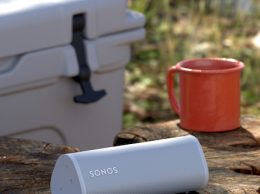Sonos fights Apple spinoffs in patent battle
IN THIS ARTICLE
- Law & Goverment Topic
- Stephen Nellis Author
By Stephen Nellis Friday, March 21st, 2014

Santa Barbara-based wireless music gear Sonos’ Play5 and Sub speakers. (Sonos media photo)
Wireless speaker maker Sonos made its first-ever disclosure of $535 million in revenue while locked in a patent fight against sophisticated opponents with ties to Apple.
Santa Barbara-based Sonos stunned the audio community March 12 when it revealed its 2013 sales and took steps to preempt patent claims. A review of court documents related to Sonos show that for nearly two years, it has been fighting a lawsuit alleging that it infringed patents with wide-ranging claims such as “System and Method for Sharing Playlists.” The suit’s ultimate backers appear to be FlashPoint Technology, a company that was spun out from Apple in the 1990s, and Concert Technology Corp., a closely related company headed by a former senior engineer at Apple.
Apple and the entities suing Sonos did not return requests for comment for this story. Sonos said it doesn’t comment on ongoing litigation.
But the Apple-Sonos rivalry has long simmered in the business press. In 2007, when a reporter for CNN Money’s Business 2.0 asked Sonos CEO John MacFarlane who he thought his company’s competition was, he answered: “Apple, Apple, Apple.”
And Steve Jobs, the late CEO of Apple, once threatened to sue Sonos over its use of an iPod-like click-wheel, according to reporting in the New York Times.
Intellectual property battles
The patent lawsuit kicked off in August 2012, when it was filed by Black Hills Media, a Delaware company that lists a corporate mailbox center as its address and was incorporated a few months before the lawsuit. The original suit was moved from Delaware to California but terminated because Sonos argued successfully that Black Hills did not yet have full possession of the patents over which it was suing. The case became active again in January when Black Hills refiled in federal court in Los Angeles.
Black Hills is owned by a North Carolina company called Concert Technology Corp., which is headed by former senior Apple engineer Hugh Svendsen. Concert Technology was formed in January 2006 by former employees of New Hampshire-based FlashPoint Technology.
FlashPoint Technology was spun out of Apple in 1996 with a suite of Apple’s digital imaging patents. In recent years, FlashPoint joined with Apple during Eastman Kodak’s bankruptcy in an attempt to prevent the ailing photo giant from selling off patents that Apple and FlashPoint claimed to own. Stan Fry, who remains president and CEO of FlashPoint, is also the chairman of the board at Concert Technology Corp., according North Carolina business records.
Black Hills Media has been an active litigant. Along with Sonos, Black Hills has taken action against Logitech, Yamaha Corp. of America and Pioneer Corp. over the same patents in the Sonos case.
Meanwhile, Sonos seems to have made the right bet on the future of home audio. For the better part of a decade, gadget reviewers consistently praised Sonos’ systems as better-designed than the competition, including Apple’s Airplay-based system.
And MacFarlane’s long and steady insistence that the future of music would be in streaming, rather than iTunes-style downloads, seems to have finally paid off. Sonos said its revenue nearly doubled in 2013 to $535 million. Sonos ran a high-profile ad during Super Bowl XLVIII and has snagged the product chief of Xbox — Microsoft’s star division in recent years — to become its product chief.
Apple did not reply to questions about whether it retains an ownership interest in FlashPoint. FlashPoint and Concert Technology Corp. did not respond to requests for comment.
‘Mining patent portfolios’
The lawsuit against Sonos alleges that the Santa Barbara firm infringed on 11 different patents related to streaming music. The patents themselves come from about a dozen distinct inventors and eight companies over a number of years.
Steve Sereboff, a patent litigator with Santa Barbara’s SoCal IP Law Group, said that it’s unusual to see a group of disparate patents in the same lawsuit. Normally, he said, when multiple patents are asserted, they all come from the same company or same set of inventors.
“To pull them together like this is no simple feat. This doesn’t happen by accident. This has the fingerprints of somebody who has considerable expertise in mining patent portfolios and pulling them together,” Sereboff said. “To be able to get this much pulled together says somebody was working at this for a long time.”
Sonos is not accused of directly infringing the patents. Instead, Black Hills Media alleges that Sonos’ provides instructions with streaming music services in a way that causes end users to infringe on the patents.
“What they’re saying is, ‘You’re teaching the customer how to infringe the patent by telling them to hook it up to the computer,’” said Michael Ram, an attorney with Westlake Village-based Koppel, Patrick, Heybl & Philpott. “Sonos is not the direct infringer. They don’t sell computers and they don’t sell playlist software.”
In late March, Sonos plans to ask a judge to put the lawsuit on hold while several of the patents are re-examined at the U.S. Patent and Trademark Office.












